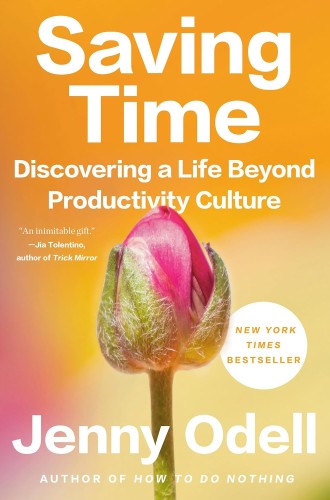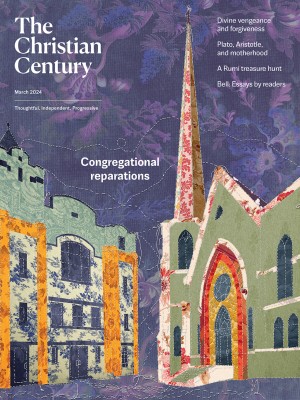De-commodifying time
Jenny Odell argues that we need to get back in touch with our preindustrial sense of time.
After the world changed in March 2020, many of us became acutely aware of the varied ways that we experience time. Extreme social distancing made time contract and expand at once, with hours crawling by while weeks flew—or perhaps the reverse. During that early phase of the COVID-19 pandemic, artist and writer Jenny Odell began to feel acutely what farmers throughout history have always known: not all minutes, hours, or days are equal in length. Though we follow a 24-hour clock, time as we experience it takes many forms.
Touching on topics as wide-ranging as the search for hope amid climate change, the experiences of people with disabilities trying to live by standardized schedules, the realities of people experiencing mass incarceration, and the perspectives of people whose sense of collective history has been forever altered by colonialism, Odell’s Saving Time argues that part of the answer to our biggest problems may entail getting back in touch with our preindustrial sense of time, seeing it less as commodity and more as the “stretchy quality of waiting and desire, the way the present may suddenly feel marbled with childhood memory, the slow but sure procession of a pregnancy, or the time it takes to heal from injuries, physical or emotional.”
Read our latest issue or browse back issues.
What makes this book powerful is Odell’s refusal to succumb to determinism. Instead, she asserts that we can choose how we organize time. For her, a better system of time management would mean, “some kind of mutually beneficial agreement between you and me about when and how we want to do things.” She cites as an example a friend with whom she agrees never to apologize for delays in responding to emails, since both understand that they will respond when they can.
Arguing for a world in which time is neither fungible nor commodified, Odell says that making deliberate decisions at both the small scale and the large one might be the antidote to the hopelessness that has become so rampant individually (with mental illness on the rise) and collectively (with fear of climate disaster leading many to think there is nothing to be done). “Would it be possible not to save and spend time, but to garden it—by saving, inventing, and stewarding different rhythms of life?” she asks. In that way, “the best way for me to get more time would be to give it to you, and the best way for you to get some would be to give it back to me. If time were not a commodity, then time, our time, would not be as scarce as it seemed just a moment ago.”
Of the many topics discussed in this panoramic book, one that stands out is the impact of colonization on perceptions of time. “Some people have had their worlds end a million times over,” states Odell. She cites the perspectives of Black and Indigenous people in Louisiana’s Cancer Alley who have experienced the slow violence caused by pollution, as well as Native Hawaiians who have seen overdevelopment and tourism affect their weather patterns. For Odell, these perspectives suggest that historical outcomes are not inevitable, and they can offer hope:
To the nihilist who cannot imagine the future, I am highlighting a perspective that has survived, and continues to survive, the long-ago end of the world. There are many people and places that could accept neither Enlightenment Man’s march of progress nor the billiard ball declinism of the Anthropocene—because that narrative was inherently premised upon their destruction, commodification, and relegation to a state of nonbeing. For those people and places, the historical past can never be an object of nostalgia, and the future has always been in jeopardy. If you don’t want to kick the can down the road, look to those who never recognized the road in the first place.
Odell alludes to the idea of sacred time and calls for prayerful reverence as an antidote to our hyperrational and utilitarian approach to time management, but the book is primarily secular in its perspective.
Still, as I read, I recalled some of the paradoxes inherent in Christian perspectives on time: the kingdom of God that is already and not yet here, and literary critic Northrop Frye’s observation that each year, Good Friday is closer to the original day of Christ’s crucifixion than to the calendar dates that precede and follow it.
While Max Weber has astutely informed us of Christianity’s contributions to the growth of modern capitalism, the portrayal of time in the gospels offers ample ideas for how to resist it. Jesus’ birth—unplanned, and not at all at an opportune time—suggests a rupture to any overarching temporal order. In Luke’s story of Mary and Martha, it is the leisurely sister rather than the bustling host who “chooses the better part” (10:38–42). Conversely, when duty calls, Matthew’s Jesus drops everything to heal the man with the withered hand, to the Pharisees’ chagrin (12:9–14). For Jesus, honoring what the Greeks called kairos—doing the right thing in the moment, whenever that may happen to be—is more important than obeying the strict rhythms of chronos.
During the first year of the pandemic, I began attending outdoor worship services organized by some local Catholic Workers who are involved with the wild church movement. Eventually, they synced these gatherings to the changing seasons: solstices, equinoxes, and the cross-quarter days that fall halfway between. One leader remarked that expressing prayerful reverence at times of changing seasons is an important way not only to honor the land but also to recognize that we don’t feel the same way on February 2 as we do on June 21. While industrial capitalism has flattened time into a uniform commodity, rituals honoring the seasons remind us that different times bring different rhythms and emotions.
Similarly, by seeking to recuperate a more holistic view of time, Odell urges us to recuperate our connectedness with the land, with other living beings, and with one another. This powerful book is a much-needed antidote to the widespread despair of our present moment. It is a call to embrace doubt and uncertainty rather than succumbing to nihilistic inevitability, to “hold the past and future apart as much as hope will allow.”







